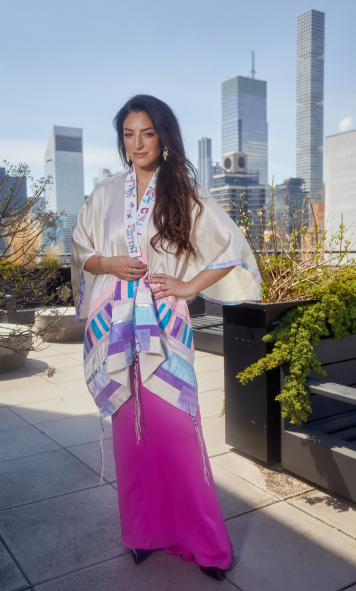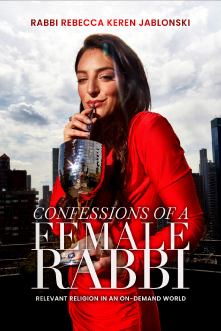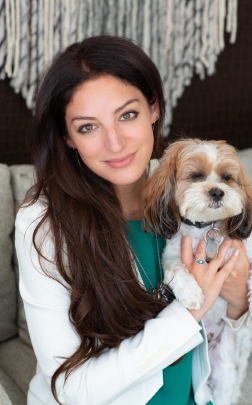In such a fast-paced world full of tech and super-sized day planners, New Yorkers can easily get lost in the grind and lose touch with their connection to spirituality, nature and being present. To help in this quest, Rabbi Rebecca Keren-Jablonski, one of New York’s most sought-after female rabbis shares the key to keeping religion relevant in an on-demand world in her tell-all guide Confessions of a Female Rabbi.

We sat down with her and got the 411 on some of her biggest confessions and sentiments from behind the bimah.
What are some of the biggest challenges we face when it comes to religion, spirituality and contemporary living?
I have found that the biggest challenge that faces modern Americans is making time and space for religious practice. Religious institutions can sometimes feel old-fashioned, impersonal, and less relevant to the daily needs of an individual or family. Religious adherence and stringency are on the decline; only 9% of American Jews consider themselves to be Orthodox, strictly practicing the religious law. Because of this, over the last several decades, membership and attendance at spiritual centers have decreased dramatically. This also means that to survive, many neighborhood churches and synagogues have to sell their buildings and consolidate or merge their congregations; this result is larger mega-institutions that are less personal and less likely to maintain active members.
As a woman who is also a religious leader, what are some of the biggest obstacles you faced and overcame that others can learn from?
As a woman in a position of leadership within religion, I always come across traditional people who devalue and outright deny my ability to hold my position. Orthodox Judaism does not allow for female clergy members, especially those who sing in public and facilitate egalitarian practice and participation from women and girls.
If you had to pick just one of your many confessions from your book which is most impactful to know, what would it be?
The most relevant confession is the confession that opens the book: “I think about Jewish survival more than ever.” I’ve dedicated my career to practical religious facilitation but beyond the worry about the irrelevance of Jewish practice, I confess to fears about our people’s survival given the worldwide surge of Jew-hatred that the Israel-Hamas war has unearthed. Jews face the dual existential threat of antisemitism in the diaspora and war in a homeland. In every generation, the enemies of the Jewish people are genocidal; they twist logic and facts to inspire acts of violence against Jewish people. Jewish people are more secular and dispersed than ever; without unification and efforts to strengthen from within, our survival is at risk.

In a 2021 report, the Pew Center for Research found that 3 in 10 Americans report being of no-religion. In the same year, a Pew study on Judaism in America found that to US Jews, Jewish identity is more than just about religious practice. Most Jews do not belong to a faith-based institution or house of worship, and more than half do not belong to any one denomination. Thankfully, Jewish practice and identity have a place for those who feel Jewish because of their ancestry, culture or practice regardless of belief. I include a chapter where a family chose to present the religion, its practices, and belief systems to their children, even though the parents were atheists. I also have expressed in other writing that Zionism, the belief that Jews have a right to self-determination in their ancestral homeland, is another expression of Judaism that has grown in popularity due to the 2023 Israel-Hamas war.
What are your feelings as we recall the sad anniversary date of October 7th. What can we learn as a people from the circumstances?
The Hebrew calendar does not match up with the secular calendar year to year; the attacks of October 7, 2023, occurred on the holiday of Sukkot/Simhat Torah, a notable season of joy; however, the first anniversary will take place during the Jewish Ten Days of Repentance. Known as the Days of Awe, the date will fall during a somber time of reflection and return for Jewish people between our New Year and the Day of Atonement. During this time, we are already looking at the past year and trying to improve upon our communal and personal failings. This includes but is not limited to what could have been done better to protect innocent civilians on both sides of the conflict. Regardless of one’s political leanings, the day itself must be upheld for memorial and prayer in honor of the many victims and their families.

Can you share some of the biggest takeaways you’ve witnessed and participated in pertaining to marriage and divorce?
As I’ve facilitated weddings and advised partners during divorce, a practice I stress to couples is to make sure they have articulated and created a shared vision for growth. With time, couples face new circumstances and challenges. Financial changes, children, world events and health can all affect the day-to-day of either partner. From the start of commitment, a couple must be honest from the outset and make an oath and roadmap for weathering each type of storm. They should look to how they problem-solve and navigate challenges. Change is guaranteed for the future–the key is that a couple is practically interested in evolving as a couple. If not, they will grow apart and separate.
What is your hope people will learn from reading your book?
I hope that people are inspired to mark life’s moments within a religious context. I hope that those who have been questioning the relevance of religion in their lives will find meaning in the case studies I explore. I hope people don’t settle for boring and passive religious experiences. We must do all we can to infuse new vigor into Jewish life and I hope that my book helps.
For more information on Rebecca Keren-Jablonski,
visit rebeccakeren.com




